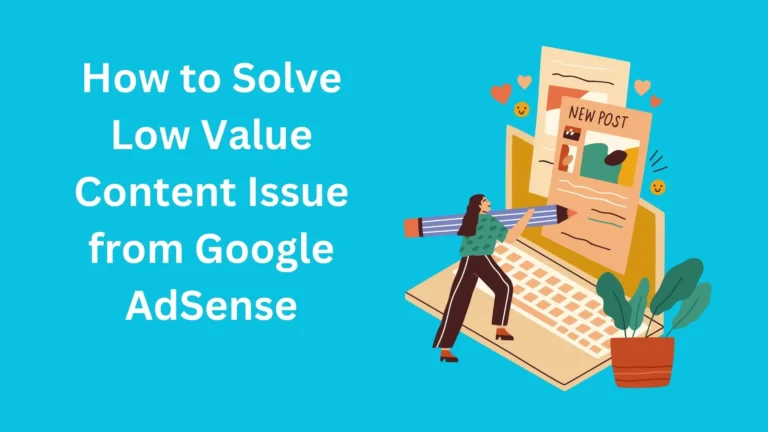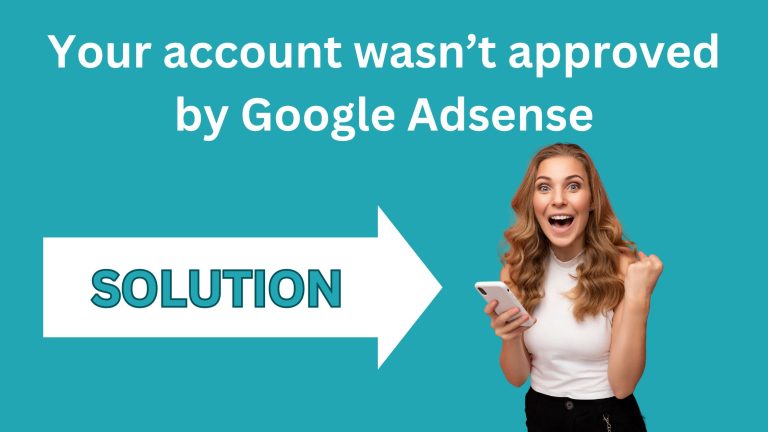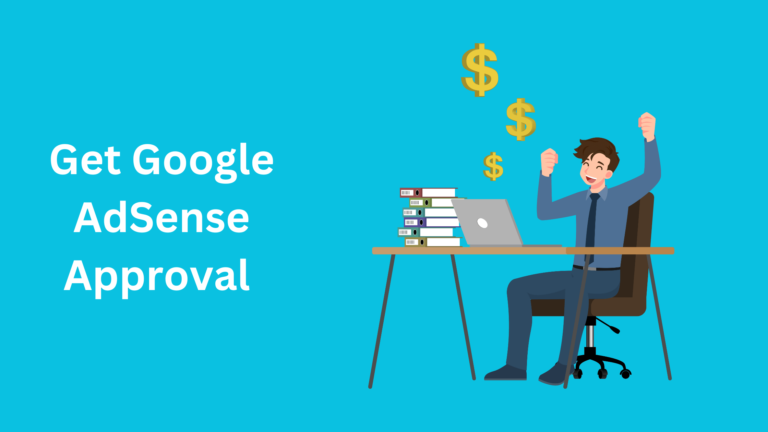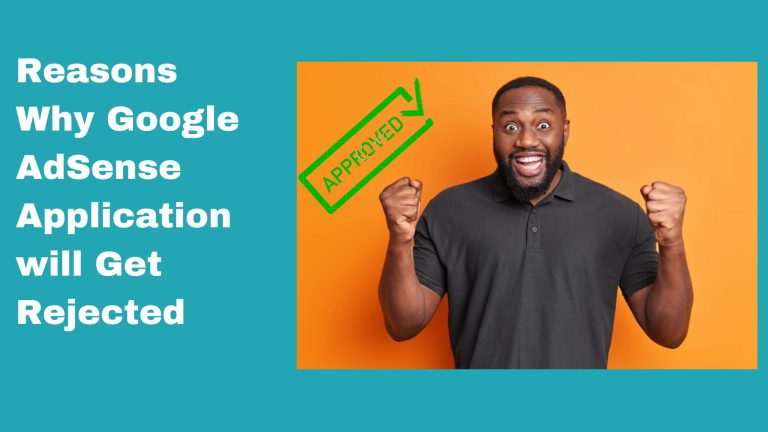Top Reasons for Google AdSense Rejection: What Went Wrong?
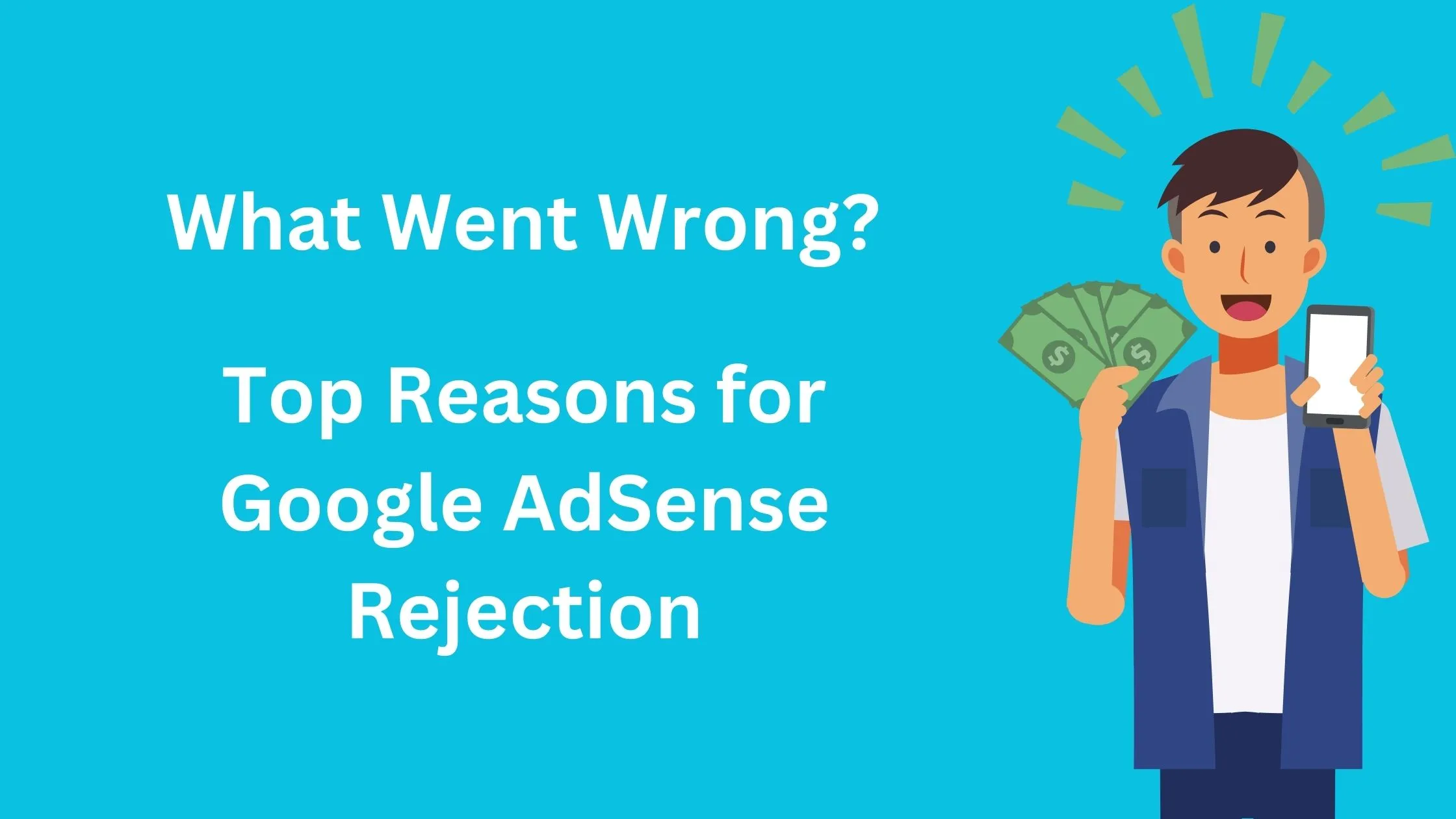
Google AdSense is one of the most popular advertising platforms for website owners and bloggers looking to monetize their content.
However, getting approved for AdSense can be a challenging process, and many applicants face rejection. If you are new to google adsense, then read our step by step guide on google adsense approval process.
If you’ve recently received a rejection email from Google AdSense, you’re not alone.
Understanding the reasons for this rejection is crucial if you want to improve your chances for approval next time.
In this blog post, we will go over the top reasons for Google AdSense rejection and provide clear, actionable steps on how to address them.
By the end of this guide, you’ll know exactly how to fix any issues with your website and improve your chances of getting approved by Google AdSense.
1. Insufficient Content on Your Website
One of the most common reasons for Google AdSense rejection is a website that lacks enough high-quality content. Google values content-rich websites because they provide value to users and increase the chances of displaying relevant ads.
Why Does Content Matter?
Google looks for websites that provide informative, well-written, and engaging content. Websites with very little content or poorly written articles can be seen as low-quality, which reduces your chances of approval. Even if your website has a good design and layout, Google needs to see substantial content that is useful to visitors.
How to Fix It:
- Increase the amount of content on your website. Make sure you have at least 15-20 unique, well-written blog posts or articles.
- Focus on quality over quantity. Google prefers informative, well-researched, and engaging articles over short, shallow content.
- Ensure content relevance to your website’s niche. It should be helpful and related to your website’s main topic or theme.
2. Poor Website Design or User Experience (UX)
The design of your website plays a big role in Google’s approval process. A website that is difficult to navigate or appears unprofessional can lead to Google AdSense rejection.
Why Does Design Matter?
A clean and professional design helps enhance the user experience.
Google values websites that are easy to navigate, visually appealing, and offer a smooth experience for users.
A poor layout, excessive pop-ups, or cluttered pages can make your site difficult to use and reduce your chances of approval.
How to Fix It:
- Ensure a clean and simple design. Your website should have a well-organized layout with clear menus, easy-to-read fonts, and sufficient white space.
- Optimize for mobile devices. More users access the web from smartphones than ever before. Ensure your website is mobile-friendly and looks great on smaller screens.
- Improve website loading speed. Slow websites can frustrate visitors and lower your chances of approval. Use tools like Google PageSpeed Insights to check and improve your website’s speed.
3. Lack of Privacy Policy, Contact Page, or About Us Page
Google AdSense requires your website to have certain pages that demonstrate credibility and transparency. Websites that lack essential pages like a Disclaimer, Terms & Conditions, Privacy Policy, Contact Page, or About Us Page are often rejected.
Why Does It Matter?
These pages help Google verify that your website is legitimate and trustworthy.
A Privacy Policy explains how you collect and use user data, while an About Us page provides context about who is behind the website.
A Contact Page allows users to get in touch with you, which is important for both trust and transparency.
How to Fix It:
- Add a Privacy Policy: This is a must-have for every website. You can create one easily using free online generators or consult a professional if needed.
- Include an About Us Page: Share information about your website, its purpose, and the team behind it. This helps build trust with both visitors and Google.
- Create a Contact Page: Provide an email address or contact form for users to reach out to you.
4. Low-Quality Traffic Sources
If your website has traffic from questionable sources or if you are using methods like paid traffic or click farms, your Google AdSense approval can be rejected. Google values organic traffic that comes from search engines or legitimate online sources.
Why Does Traffic Matter?
Google wants to see that your website is attracting real, interested visitors. Fake traffic or traffic generated from unreliable sources can make your website appear spammy and fraudulent.
How to Fix It:
- Focus on organic traffic. Drive traffic to your website through content marketing, SEO, and social media.
- Avoid using paid traffic. Google doesn’t look favorably on websites that use paid services to generate artificial traffic.
- Build a genuine audience. Focus on attracting users who are genuinely interested in your content, not just those clicking on ads.
5. Duplicate or Copied Content
If your website contains a significant amount of duplicate content or content that is copied from other websites, you will almost certainly face Google AdSense rejection.
Why Does It Matter?
Google values original and unique content.
Websites that feature copied material or duplicate content do not add value to users, and Google will be hesitant to approve them for AdSense.
How to Fix It:
- Create original content. Make sure all the content on your website is unique and offers value to your visitors.
- Avoid copying content from other sources. Even if you quote others, always provide proper attribution.
- Use plagiarism checkers. Tools like Copyscape can help ensure that your content is original and not copied from other websites.
6. Non-Compliant Content (Violating AdSense Policies)
Google has strict content policies regarding what can and cannot be published on a website. If your website contains prohibited content like adult material, hate speech, violence, or anything that violates AdSense guidelines, your application will likely be rejected.
Why Does Content Compliance Matter?
Google wants to create a safe and positive environment for advertisers and users.
If your content violates their policies, they will reject your application to maintain the integrity of the AdSense network.
How to Fix It:
- Review Google’s AdSense Content Policies carefully and make sure your website complies with them.
- Remove or modify any content that may be deemed inappropriate or non-compliant.
- Avoid promoting illegal activities or harmful behavior on your site.
7. Incomplete or Poorly Written Website Pages
Another reason for AdSense rejection is having incomplete or poorly written pages on your website. Google evaluates the overall quality of your content, and if it’s evident that your website isn’t fully developed or professional, you may face rejection.
Why Does Quality Matter?
Google wants to promote websites that provide a valuable user experience. Websites with incomplete or poorly written pages do not inspire trust in users or advertisers.
How to Fix It:
- Ensure all pages are fully developed. Make sure that your website is complete with no missing or unfinished pages.
- Improve your writing quality. Make sure your articles are clear, concise, and grammatically correct. You can hire a professional editor or use grammar tools to check your content.
- Add images or media. Enhance your content with relevant images, videos, or infographics to improve the user experience.
8. Website Not Fully Ready for Google AdSense
Google wants to see that your website is fully functional and ready for monetization before approving you for AdSense. If your website is still under construction, missing key features, or has broken links, it will likely be rejected.
Why Does Readiness Matter?
Google wants to ensure that users will have a seamless experience when visiting your site, and that ads will be displayed properly. If your website isn’t fully ready, it won’t meet AdSense’s standards.
How to Fix It:
- Ensure your website is live and fully functional. Avoid submitting a site that is still in the “under construction” phase.
- Test all links and functionality on your website to ensure everything works as expected.
- Add important features like a search bar, clear navigation, and a well-organized structure.
Conclusion: Avoiding Google AdSense Rejection
If your Google AdSense approval was rejected, it’s important to identify the specific reasons for the rejection and take the necessary steps to fix them. By addressing the most common reasons for AdSense rejection — including insufficient content, poor website design, and compliance issues — you can greatly improve your chances of getting approved on your next attempt.
Remember, Google values quality and user experience above all else. Focus on building a legitimate, content-rich, and user-friendly website, and you’ll be well on your way to becoming a successful AdSense publisher.
By following the tips in this blog post, you’ll be better prepared for your next AdSense application and increase your chances of approval.
Good luck!
Read Related Articles
Top 12 Reasons Why Google AdSense Rejected
Why Google AdSense Rejected Your Application (And How to Fix It)
How to fix low value content

With 5+ years of SEO experience, I’m passionate about helping others boost their online presence. I share actionable SEO tips for everyone—from beginners to experts.
